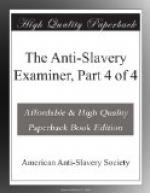“YE THEREFORE APPLAUD AND DELIGHT
IN THE DEEDS OF YOUR FATHERS;
FOR THEY KILLED THEM, AND YE BUILD THEIR
SEPULCHRES."[19]
The slaveholder may eagerly and loudly deny, that any such thing is chargeable upon him. He may confidently and earnestly allege, that he is not responsible for the state of society in which he is placed. Slavery was established before he began to breathe. It was his inheritance. His slaves are his property by birth or testament. But why will he thus deceive himself? Why will he permit the cunning and rapacious spiders, which in the very sanctuary of ethics and religion are laboriously weaving webs from their own bowels, to catch him with their wretched sophistries?—and devour him, body, soul, and substance? Let him know, as he must one day with shame and terror own, that whoever holds slaves is himself responsible for the relation, into which, whether reluctantly or willingly, he thus enters. The relation cannot be forced upon him. What though Elizabeth countenanced John Hawkins in stealing the natives of Africa?—what though James, and Charles, and George, opened a market for them in the English colonies?—what though modern Dracos have “framed mischief by law,” in legalizing man-stealing and slaveholding?—what though your ancestors, in preparing to go “to their own place,” constituted you the owner of the “neighbors” whom they had used as cattle?—what of all this, and as much more like this, as can be drawn from the history of that dreadful process by which men are “deemed, held, taken, reputed, and adjudged in law to be chattels personal?” Can all this force you to put the cap upon the climax—to clinch the nail by doing that, without which nothing in the work of slave-making would be attempted? The slaveholder is the soul of the whole system. Without him, the chattel principle is a lifeless abstraction. Without him, charters, and markets, and laws, and testaments, are empty names. And does he think to escape responsibility? Why, kidnappers, and soul-drivers, and law-makers, are nothing but his agents. He is the guilty principal. Let him look to it.
[Footnote 19: You join with them in their bloody work. They murder, and you bury the victims.]
But what can he do? Do? Keep his hands off his “neighbor’s” throat. Let him refuse to finish and ratify the process by which the chattel principle is carried into effect. Let him refuse, in the face of derision, and reproach, and opposition. Though poverty should fasten its bony hand upon him, and persecution shoot forth its forked tongue; whatever may betide him—scorn, flight, flames—let him promptly and steadfastly refuse. Better the spite and hate of men than the wrath of Heaven! “If thy right eye offend thee, pluck it out and cast it from thee; for it is profitable for thee, that one of thy members should perish, and not that thy whole body should be cast into hell.”




